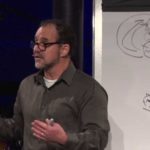We run our website the way we wished the whole internet worked: we provide high quality original content with no ads. We are funded solely by your direct support. Please consider supporting this project.

7 Ways to Join the Kingdom Revolution
In the previous post, I introduced in short form the call to participate in the kingdom revolution that Jesus began. What does this mean for us today? Let me offer seven ways we are called to the Jesus revolution:
- When Jesus set aside the riches of his divine prerogatives and sided with the poor and oppressed (2 Cor. 8:9), he was revolting against a culture that privileged a few by oppressing the masses. By how he lived and taught, Jesus manifested God’s justice and revolted against the powers of evil that fuel injustice. All who submit to Christ are called and empowered to join in this anti-poverty revolution. We are to shun greed, be generous and care for the poor.
- When Jesus praised the faith of a Roman Centurion and held up Samaritans (in explicit contrast with Jewish leaders!) as heroes in some of his illustrations, he was revolting against a culture that placed some above others on the basis of their race. By how he lived and taught, Jesus manifested God’s dream of a unified humanity that reflected his own triune love. And in the process of doing this, he revolted against the powers that fuel racism. All who are part of the church are called and empowered to join in this anti-racism revolution. We are to manifest the “one new humanity” Jesus died to create and cultivate a kingdom community in which ethnic prejudices are abolished (Eph 2:15).
- The respectful way Jesus treated women— even women with disreputable histories (Jn. 4)—revolted against a culture that tended to empower men and dehumanized women. By how he lived and taught, Jesus manifested God’s co-equal ideal for men and women, and in the process of doing this, he revolted against the powers that fuel sexism. All who have been freed from the powers and who participate in the life of God are called and empowered to advance this anti-misogyny revolution. We’re to manifest the truth that in Christ there is neither male nor female (Gal 3:28) and recognize people’s calling based on their gifts, not their gender.
- The dignifying way Jesus interacted with beggars and others on the fringe of society revolted against a culture that ascribed worth to people based on their class, wealth, and power. By how he lived and taught, Jesus manifested the beauty of God’s dream of a classless kingdom and revolted against the powers that fuel classism. All who are consecrated as first fruits of the coming kingdom are called and empowered to join this classless revolution. We’re to treat all people as possessing unsurpassable worth, for each is a person whom God deemed worth dying for.
- Along the same lines, when Jesus ate and fellowshipped with prostitutes and tax collectors, he was revolting against a culture and religious system that judged some as worse sinners than others based on a self-serving, sin-gradation scale. The scandalous way Jesus treated lepers and others deemed untouchable revolted against a culture and religious system that dehumanized certain people by declaring them “unclean” while barricading them from the community. Similarly, when Jesus fed and healed people on the Sabbath, he was revolting against a dehumanizing culture and religious system that placed compliance with religious rules over the well-being of people. By how he lived and taught, Jesus manifested the beauty of God’s reign and revolted against the powers that fuel these forms of religious oppression. All who have been saved by God’s grace are called and empowered to join this beautiful, anti-religious, revolution. We are to live with the awareness that we are the worst of sinners (Mt. 7:1-3; I Tim. 1:15-16) and embody Christ’s scandalous love to all those whom society and/or religion deem to be the worst of sinners.
- Whenever Jesus came upon spiritually-oppressed people he delivered them, and whenever he confronted people with physical afflictions, he healed them. By how he lived and ministered, Jesus manifested the beautiful freedom and wholeness of God’s reign and revolted against the powers that fuel demonization and infirmities. All who are part of the restored humanity in Christ are called and empowered to join in this revolt against spiritual oppression and physical infirmities. We are to be a people who in the name of Jesus rout demons and heal the sick.
- Finally, when Jesus refused to use violence to protect himself against enemies, choosing instead to manifest God’s love by allowing them to torture and kill him, he was revolting against a culture and an entire world system that encourages people to use violence when it’s in their self-interest, or their nation’s self-interest, to do so. By how he lived and taught, Jesus manifested God’s dream of a non-violent humanity and revolted against the powers that fuel all violence. All who have pledged their life to Christ are called and empowered to join in this anti-violence revolution. We are never to retaliate, never to return evil with evil, and never to resort to violence (Matt 5:28-42). Instead, we are to love and do good to our enemies, blessing them and praying for them even when they threaten us or our nation. If our enemy is hungry and thirsty, Paul says, we are to feed them and give them something to drink (Rom 12:20). Even when facing life-threatening persecution, we are to respond in the loving and gentle way Jesus did (1 Pet 2:21-22).
When God’s will is fully established on earth as it is in heaven when Christ comes again, there will be no more power structures privileging some people over others: men over women, rich over poor, intelligent over the intellectually challenged, talented over the untalented, whites over non-whites, or anything of the sort. We who constitute God’s church are to manifest in the present all that will be present when the kingdom is fully come. We are individually and collectively to manifest what it looks like for humans to be completely free from all things that stand against God’s kingdom. We are called to live out the kingdom now by revolting against whatever will be done away with when the kingdom is fully come.
Photo credit: campra via VisualHunt / CC BY-NC-ND
Category: General
Tags: Kingdom Living, Kingdom Revolution
Topics: Following Jesus
Related Reading

Sermon: Reframing the Sun
In our clip from this weeks sermon, Greg Boyd talks about how we respond to misfortunes and tragedies depends on how we frame them. In Colossians 3, Paul writes that Christ is all and is in all. When we frame our life within this understanding, we begin to see how we can live through misfortunes…

A Blessing for 2015
Image by Jean-Michel Guisiano via Flickr In the Kingdom, there is no waiting. There is only now. The time to be fully awake and fully alive is now. The time to abide in Christ and to live passionately in love is now. The time to live in God’s presence and let God be “all in all” is…

Responding in Love
The world is full of conflict where evil begets more evil. Violence produces more violence. Arguments produce more arguments. It’s a tit-for-tat world. What is God’s strategy for stopping this conflict? How does God respond to evil, and how does God call us to respond? This strategy might even come in handy during heated conversations…

Lies, Truth, and the Holy Spirit
The root of the flesh is a lie about who God is and who we are. Satan brings us into bondage of the flesh by convincing us that God is not the loving God he says that he is. In doing this, Satan convinces us that we cannot find fullness of life by being wholly…

Our Insatiable Hunger
The only kind of life animals care about is biological. If their basic physical needs for food and shelter are met, they’re satisfied. Humans also want their basic physical needs met, of course, but that isn’t enough. We hunger for more. Not only do we want to be alive, we want to feel fully alive.…

How to Overcome the Flesh Mindset
Unless you have taken intentional steps to change, the way you presently experience yourself and the world around you was mostly chosen for you, not by you. Think about that. You inherited a way of interpreting the world. Your brain has been in the process of becoming programmed by factors outside your control from the…
